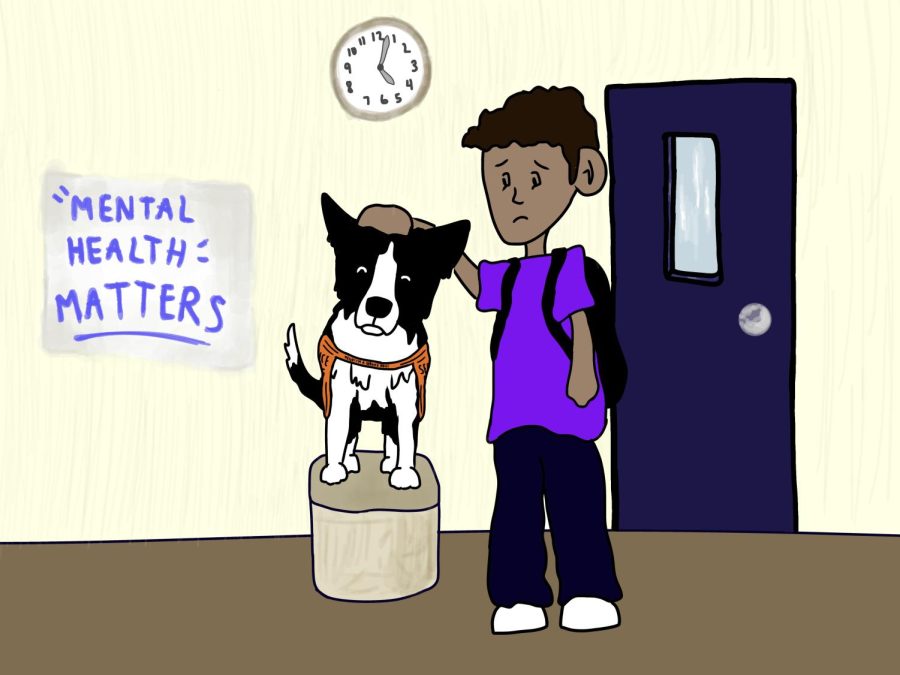Schools need therapy pets
With the pandemic and the tragedy at Oxford High School, students need to feel comfort and security now more than ever; there should be emotional support animal (ESA) in schools to help students.
Pet owners share characteristics of emotionally healthy people, like resilience, self-confidence and the ability to create strong relationships, according to the Journal of Personality and Social Psychology. However, not everyone owns an animal and interactions with them is important. They provide companionship, medical benefits, social and emotional health and more.
High school is overwhelming and when life gets overwhelming, it is recommended by adults and school counselors to talk to someone, but sometimes sharing is hard. Alternatively, animals provide comfort, as they are great listeners. There is a link between intelligence and talking to animals, according to a study by Harvard University.
The school advocates for mental health with posters hung around the school. A mental health club, Supporting Others Arise Radiantly (S.O.A.R.), encourages students to meet with counselors if feeling down, which is a great start. To fully provide mental health resources, ESAs need to be at the school.
For those with allergic reactions to pet dander, precautions can be taken to avoid allergic reactions. The animal could stay in a portion of the building where students typically do not walk through such as the E.C.C. By doing this, allergic reactions can be avoided. The school could also bring in alternative animals, such as chinchillas or lesser common allergy pets to still provide them the opportunity to connect to release stress and reap the benefits.
It can be argued some students may take advantage of the program and go see the animals for fun and skip class. However, taking a break from class occasionally allows the body to improve attentiveness, reduces stress and help with memory, according to learningliffoff.com.
To see an ESA would be a privilege and not a right. To avoid students skipping class or leaving and missing out on lessons, teachers could approve students to see the ESA animals. The student wouldn’t have to say the reason why they want to go down, but they would need to let their teacher know where they are in case of emergencies.
Other service animals such as leader dogs or medical alert dogs are allowed where their owners go under the Americans with Disability Act (ADA). Service animals are defined as “an animal, typically a dog, that has been trained to assist a person who has a disability,” according to the dictionary. Mental illness can be considered a disability, so by definition, emotional support animals should be allowed on school property, yet there are no animals helping students through hard times.
Students would need a doctor’s note on file with the school proving the need for a personal ESA and sign a contract stating the animal’s owner is responsible for any possible damage or incidents. This would allow the school to not be held liable. In addition to allowing personal ESAs, the school would provide dogs for more comfort.
To provide ESA resources, the school could hire a company with trained therapy dogs. This limits the amount of work the school would have to do and instead allows them to focus on the well being of students and staff. Hiring a company would cost money, but the benefits of therapy animals outweigh the costs.
To allow the animals and handlers a break, there would be a schedule of when the animals visit the school.
Neighboring schools districts, such as Rochester and Oxford, implemented therapy dog programs into their schools. Utica Community Schools (UCS) could look to them for guidance.
The students benefit from the animals, but the animals can benefit from the programs. If the school decided to go forward with a program, more animals would need to be trained and more people hired to meet the demands of the buildings, thus creating more jobs.
To give students all the mental, physical and emotional health benefits, therapy dogs or emotional support animals need to be brought into the district. To make this happen, students should speak up to the school board and make sure their voices are heard.
Your donation will support the student journalists of Eisenhower High School. Your contribution will allow us to purchase equipment and cover our annual website hosting costs.






